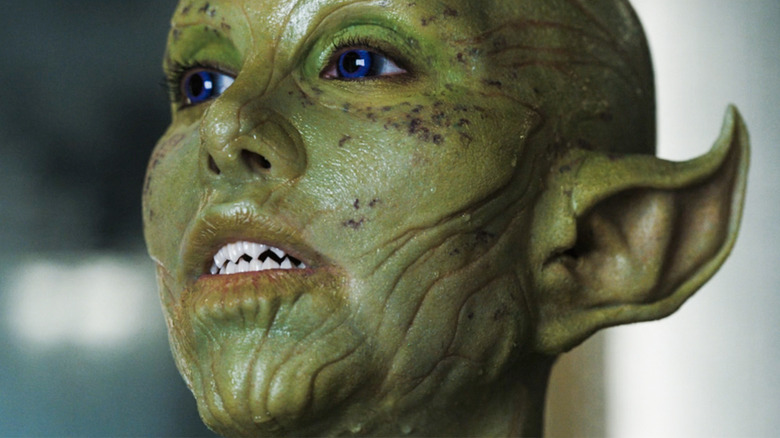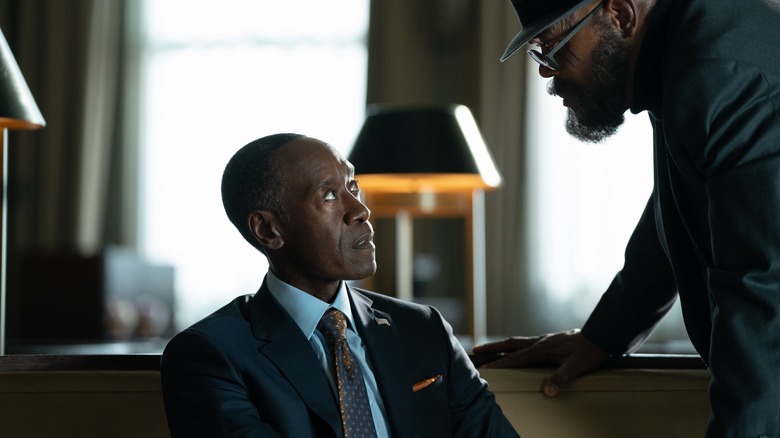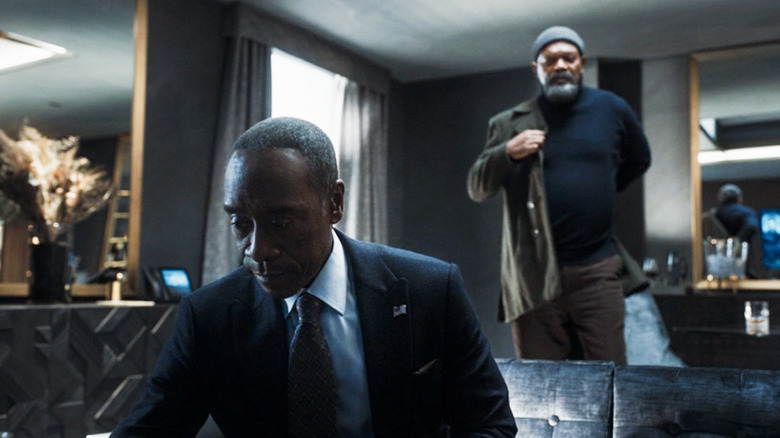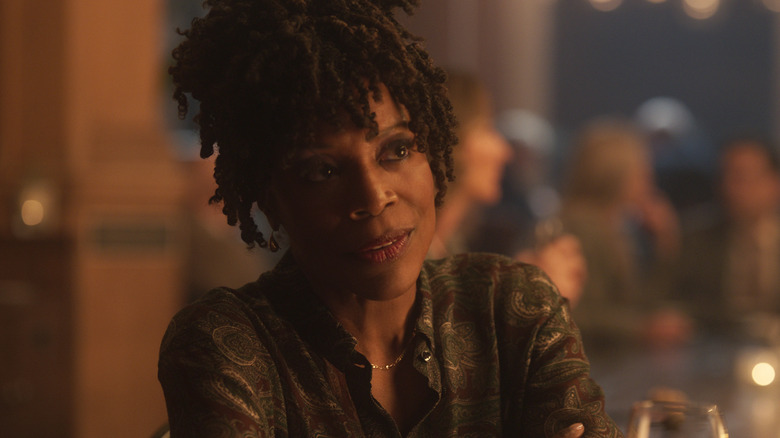Secret Invasion Spotlights The Awkwardness Of Skrulls Doing Blackface
This article contains spoilers for "Secret Invasion" up to episode 4, "Beloved."
The Skrulls have been getting up to some pretty problematic antics in Marvel's "Secret Invasion." Kidnapping people, stealing their memories, and secretly replacing them? Problematic. Trying to kill the president? Problematic. Detonating bombs in a crowded square, killing thousands of people? Really problematic, guys.
But while the global politics stakes of the series don't feel particularly impactful (last week's episode brought Earth within seconds of nuclear warfare and the threat never really had any gravity to it), "Secret Invasion" has been drawing attention to the complex implications of a reptilian race of shapeshifters taking over human identities. Specifically: does a Skrull "simming" a Black person count as blackface?
Though the concept of blackface centers on extremely caricatured and racist performances, from 19th century minstrel shows to 21st century sketch comedy shows, the definition broadly covers any instance of someone who isn't Black attempting to falsely present themselves as such. Therefore, aliens shapeshifting in order to impersonate Black characters, and being played by Black actors in those scenes, isn't something that most people would immediately associate with the concept of blackface. Nonetheless, "Secret Invasion" has subtly but very deliberately lampshaded the issue through Nick Fury's (Samuel L. Jackson) interactions with his supposed ally, Colonel James "Rhodey" Rhodes (Don Cheadle).
'Men who look like us'
During their confrontation in "Secret Invasion" episode 2, "Promises," Fury makes an appeal to their shared identity and heritage when asking for Rhodey's help with the Skrull invasion, telling him:
"We owe each other. Men who look like us don't get promoted because of who our daddies know. Every ounce of power we wrestle from the vice grip of the mediocre Alexander Pierces who run this world was earned in blood. So let's make the power mean something. Help a brother out."
Now, Rhodey (or, as fans have now dubbed this Skrull impersonator, "Skrhodey") probably should have left that one alone. Though Skrulls scrape the memories of the people they impersonate for vital information, they don't seem to have any deeper understanding of the subject's mind, and miss out on the finer details of behavior (like when Skrhodey slips up and refers to Fury as "Nick"). Episode 4 reveals that the version of Rhodey we've seen in the show is actually a female Skrull called Raava (Nisha Aaliya), and the short months she's been impersonating a high-ranking colonel who works directly for the president probably haven't given her any real appreciation of what it's like to be a Black man in the U.S.
Despite this, Skrhodey decides to embrace this turn in the conversation, even citing their shared "professional, personal, ancestral history" as he fires Fury, and finishing his speech with a parting blow that mocks Fury's "help a brother out" plea: "You earned all this smoke, brother."
Yikes, Skrhodey. Not cool.
'Us brothers got to stick together'
Based on what we learn in "Secret Invasion" episode 3, Fury must have known Rhodey wasn't himself the second he called him "Nick," which adds an extra edge to his anger at the end of their confrontation in episode 2. While his own speech to Rhodey regarding "men who look like us" may have been partly manipulation, it still involved opening himself up a little. For Fury to appeal to Rhodey as a fellow Black man, only to have his own words turned against him by what turns out to be a Skrull imposter wearing Rhodey's face, has to be pretty galling.
By episode 4, "Beloved," Fury's initial fury has been distilled into passive aggression. After breaking into Skrhodey's hotel room in order to trick him into drinking a liquid tracker, he once again repeatedly appeals to the colonel's Blackness — only this time, we know that Fury knows he's talking to a fraud. Lines like "us brothers got to stick together" and "if you waste one drop of this Family Reserve, I guarantee you your ancestors will reach out from the beyond and strangle your Black ass" now have a very different energy to them. The latter line in particular sees Fury weaponizing the fact that Skrhodey has an imperfect understanding of Black identity — planting the suggestion that not drinking the laced bourbon will draw suspicion.
To drive home the utter awkwardness of an alien trying to convincingly impersonate a Black man, Skrhodey concludes their conversation by telling Fury that he's going to drink the rest of the bottle of Pappy Van Winkle's Family Reserve, "cause baby, this is fire!" (Jackson's silent reaction to this line is priceless.)
'Who is she?'
Nick Fury's distaste towards Skrhodey is contrasted with his relationship with his wife, a Skrull called Varra who took over the appearance and life of a woman called Priscilla (Charlayne Woodard). "Secret Invasion" episode 3, "Betrayal," shows Fury's first meeting with Varra in Priscilla's form, back in 1998. While at this point Fury must have been used to seeing Skrulls impersonate humans, having set up an entire division of Skrull spies to do just that, he seems initially uneasy with Varra's appearance.
"This new face of yours is..." he begins, leaving the sentence hanging. "Beautiful? I agree," Varra responds. But Fury wants to know, "Who is she?"
The question is answered in episode 4, when Fury asks Priscilla, "Would you tell me the story? About how you chose ... her." It's suggested that it's a story he's heard before, or at least heard parts of. Priscilla explains that the original Dr. Priscilla Davis was a human woman she knew, who had been secretly dying of cancer, and confesses that she visited Priscilla in the hospital because she was "looking for someone who would slip your defenses."
Nonetheless Priscilla gave permission for Varra to take over her identity, and held her to several conditions that included continuing to be a daughter to Priscilla's parents. This consent, along with the fact that Varra has never tried to deceive Fury about her true identity, could explain why he is more comfortable with her appropriation of a Black person's identity than he is with Rhodey's.
So far this undercurrent in "Secret Invasion" has been confined to subtext, and it's probably best if it stays that way. Blackface is the kind of thorny real-life issue that can't be meaningfully dealt with in the hypothetical context of a story about shapeshifting reptilian aliens. Still, in lieu of a satisfying spy thriller storyline in "Secret Invasion," the character interactions between Fury, Priscilla, and Rhodey stand out as uniquely thought-provoking.



